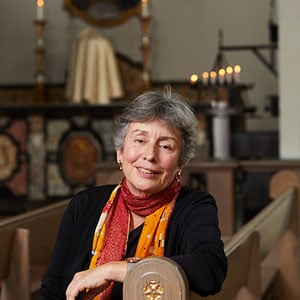 Professor Teresa Berger sat down with Divinity School student, Zachary Ladwig GRD '20 to talk about leisure, academics and faith.
Professor Teresa Berger sat down with Divinity School student, Zachary Ladwig GRD '20 to talk about leisure, academics and faith.
ZL: Where do you most like to travel to?
TB: It is difficult to pick just one place, as I regularly migrate between the U.S. and Europe. I am lucky enough to feel at home in these two places; leaving here and coming back both have a sense of going home! I always miss the ancient, Romanesque churches in Europe. The church itself feels integrated into daily life; it feels more natural, as though it is part of the fabric of life itself. It allows me to be present in the moment.
ZL: Has teaching ever presented any challenges to your faith?
TB: The events of 9/11 presented a serious pedagogical challenge. I was teaching a class called “Prayer and Providence” at the time. How do you discuss providence in light of such tragedy? How do you give thanks for a God that enabled many people to escape, when so many of them did not escape? It ended up creating a laboratory in how to think about God’s presence in the midst of disaster.
ZL: I’ve always enjoyed your work with gender and liturgy. What is something you feel Catholicism could improve on in this vein?
TB: My background is in liturgical studies and Catholic theology. I have always drawn on other disciplines in my research, which does include feminist historiography and theology, and then increasingly gender theory and history. So, I can only speak as a scholar of liturgy and a theologian. There are a few things on this subject I wished everyone would appreciate more deeply. The first is that the questions of gender difference are much richer and more diverse than people generally know. Looking back into the tradition produces a quite complex image. There have always been struggles about gender, it’s not something new, or a temporary cultural moment. Second, I think that our broader cultural context has hyper-marked gender in particular ways. Naming this hyper-marking is important, but we also should not naturalize it. It’s not a lasting phenomenon, but rather a moment in time. Gender as hyper-marked and as a lifelong project rather than a stable, fixed identity, also becomes a problem for the witness of the Catholic Church.
Teresa Berger is Professor of Liturgical Studies and Thomas E. Golden Jr. Professor of Catholic Theology at Yale Divinity School. She teaches in the field of liturgical studies and in Catholic theology, holding doctorates in both fields. To learn more about Dr. Berger, visit: bit.ly/TeresaBerger.



